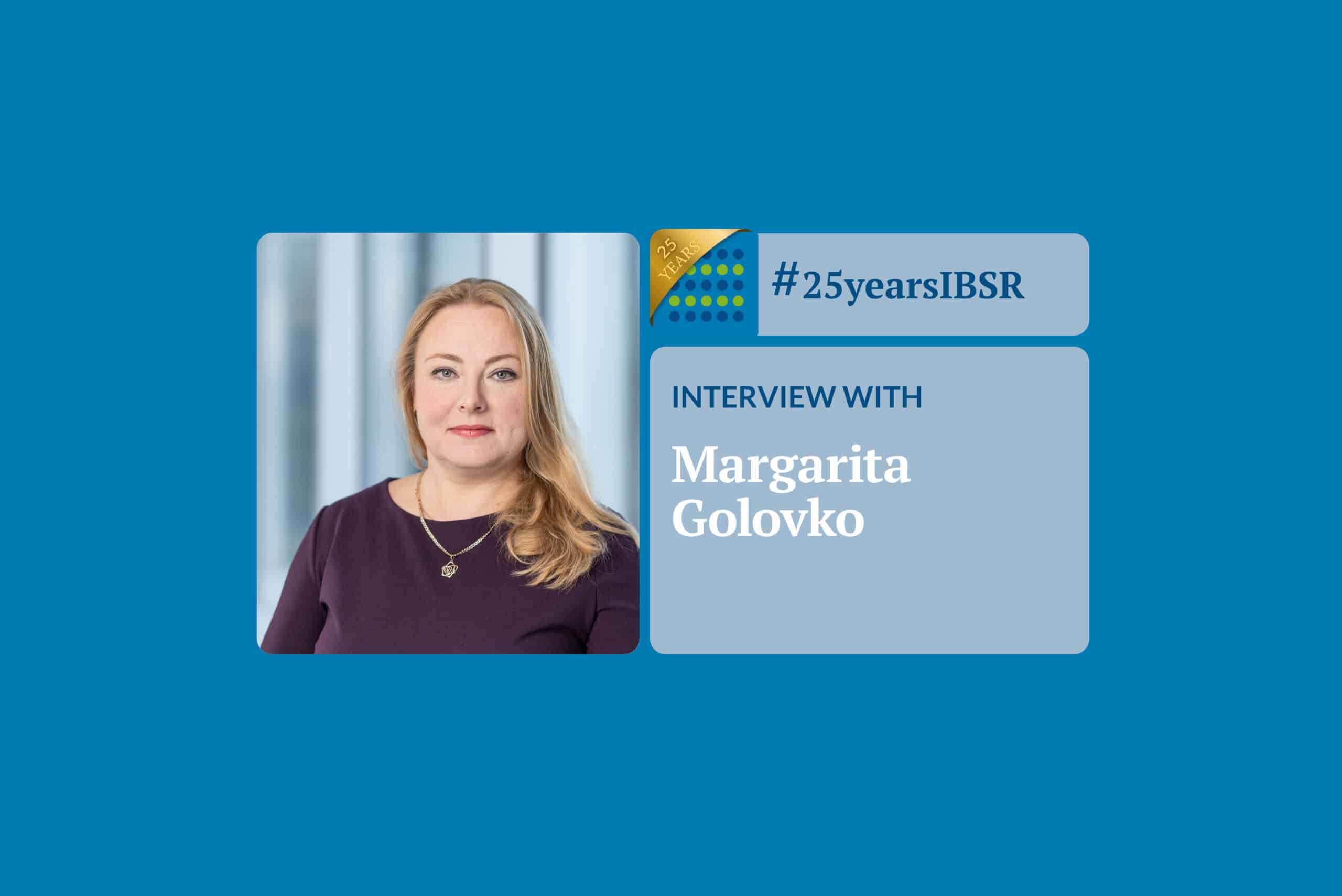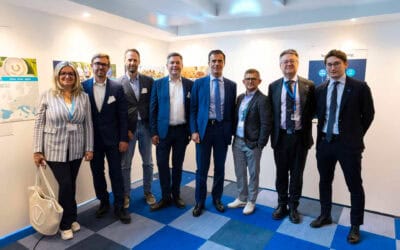
8 May 2023
Transnational cooperation is part of our life now
#25yearsIBSR
Why ‘common’, ‘innovative’ and ‘urgent’ so well describe Interreg? What convergence effects does Interreg trigger? Read the interview with Margarita Golovko, the Monitoring Committee member from Estonia, to find out!
Anna Gałyga: What are your first memories related to Interreg Baltic Sea Region?
My very first memories go back to the Programme conference in Tallinn. I remember that we were involved in the organisation of the event as Mr Ilves, the Estonian President at that time, attended the conference.
In terms of the Programme management, I remember when I joined the Monitoring Committee of the Programme as the leader of the national delegation. Until this moment, I had only been involved in cross-border cooperation. I was amazed by the scale of the topics that were taken up by the Programme and the number of already functioning pan-Baltic networks as well as by the professionalism of the MA/JS staff.
How has Estonia benefited from Interreg Baltic Sea Region over those past years?
Estonia joined the Programme in 2004 so we will celebrate 20 years of being in Interreg next year. It has been the time for Estonian organisations and authorities to look outside the national borders. It’s extremely important that they started very active and hands-on cooperation, thinking across the borders and taking joint efforts. Transnational cooperation is part of our life now; you cannot separate it from our everyday management any more.
When I looked at projects that have been supported since 2004, I can see that challenges and objectives formulated for the current Programme are logically stemming from the ones 20 years ago.
At the beginning of 2000s, we were talking about networking, exchange and learning. Although this is still relevant, today we are talking also about piloting and more practical results. It is a huge yet logical development of cooperation in the region.
What practical outcomes of cooperation in projects you mention?
Recently, one of the topics raised in Estonian newspapers was about renovating building stock and new regulations by the European Parliament. It will be a challenge for many Estonian local governments to cope with energy efficient renovation of buildings. But there is one municipality, the Rakvere city, which may soon become the first city in Estonia with most of the building stock already renovated. I tend to believe that such outstanding results are possible – to a large extent – thanks to Rakleve’s involvement in Interreg projects.
In 2005, Rakvere was involved in the project BEEN: Baltic Energy Efficiency Network for the Building Stock, financed by the Interreg Baltic Sea Region IIIB Programme. The project dealt with energy efficiency and refurbishment of residential buildings. Then they participated in the project URB.Energy, which was about developing concepts and strategies for energy efficient renovations of residential areas. Later on, they also participated in some more specific cross-border projects on the same theme.
Another example are projects dealing with efficient management of industrial sewage and wastewaters, and effective methods of removing pharmaceuticals from wastewaters. I can mention projects such as IWAMA, BEST and CWPharma here. It is interesting to discover that one organisation, Estonian Waterworks Association, participated in all of them. It is an umbrella organisation covering different water-related topics. I know for sure that knowledge and experience they gained in Interreg projects has been spread around the country.
The project ChemSAR proves how the Programme can influence national procedures. The Estonian Police and Border Guard Board confirmed that several national internal procedures and regulations have been changed thanks to the agreements made during the project. In my view, it was one of the best result-oriented projects we have had.
Last not last least, I would like to bring up huge baggage of knowledge and capacity that was developed in our universities throughout those years. They are still active participants in our projects but the activities they are implementing are very practical. We also discovered that our universities, municipalities and other organisations active in Interreg projects easily cooperate in internal contexts now. We’ve noticed that convergence effect and that’s really great.
Thinking about Interreg, what associations come to your mind?
I would put three words to describe Interreg: common, innovative and urgent.
Why common? I believe that this Programme is one of a very few initiatives in our region where we agree on joint common objectives and challenges to deal with. Then, we also agree on joint actions and follow up on them.
Another word is innovative because organisations come to Interreg to try out something new, to learn something from others who already applied certain solutions in their regions.
Urgent, on the other hand, means that the Programme addresses the most acute issues in the region. Transnational cooperation is complex: you need a lot of time, knowledge and resources for it. If you are ready to invest so much into this, it means that you are dealing with the most important and pressing topics.
What is so special about Interreg?
Interreg is still the one of few instruments where Member States sit together at one table and discuss what’s important. I can’t see another instrument that would deal with very concrete issues that are jointly agreed on and jointly dealt with.
It is the only regional specific instrument that addresses common regional needs in the most effective and focused way.
I dare to speak on behalf of Estonian beneficiaries, as many of them admitted it: the main difference between an Interreg project and any other international projects is that Interreg projects are substantive and lead to tangible results. We create very specific and focused strategies for the region in Interreg.
In this context, what would you like to wish for the Programme for the upcoming years?
I wish to the Interreg Baltic Sea Region Programme and its beneficiaries that they dig even deeper, address more specific common regional and national challenges. More focus is what I would like to see in the future.
#25yearsIBSR
This year, our Interreg Baltic Sea Region Programme is celebrating its 25th anniversary. For more examples of #MadeWithIBSR project results and testimonials of great people who have helped shape the regions with us, visit our birthday celebrations page!
More recent news
How transnational cooperation is building Europe´s future with youth
Explore how transnational cooperation is transforming Europe, from addressing climate change to fostering local economic growth. This exhibition highlights the powerful impact of collaboration beyond borders in shaping a stronger, more united future.
CompositeCircle kicked off in Lappeenranta: setting the stage for circular innovation
The CompositeCircle project officially launched with a multi-day kick-off meeting in Lappeenranta, Finland, bringing together partners from across...
(No title)
Energy Equilibrium seminar in Lithuania — Energy Accumulation for municipal energy sector
With the support of Association of Local Authorities in Lithuania the seminar “Energy sector planning in municipalities for the transition to...



